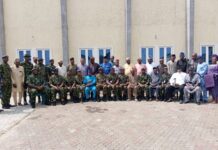Kwara is leading in maternal and child mortality reduction in the country with 68.3 per cent, Saving One Million Lives Programme For Results (SOML PforR) has said.
Dr Ibrahim Omar, the Programme Manager of SOML PforR in Kwara, disclosed this on Tuesday in Ilorin at a news conference.
Omar added that “Kwara is leading in maternal and child mortality reduction in North-Central Zone and indeed the whole country on evaluated baseline survey with 68.3 per cent in the Federal Government initiative.”
He recalled that the Federal Government initiated the Saving One Million Lives Programme for Results (SOML PforR) in 2012.
According to him, it is aimed at rolling back child and maternal mortality in the country and save an estimated 900,000 women and children that die each year from preventable causes.
The programme manager added that “after 2019 re-evaluation, Kwara led the whole country on performance, which is a huge step.”
He explained that the re-evaluation was conducted by the National Health Facility Survey to collate data on a number of services.
Omar said that SOML PforR is all about available services such as family planning, programmes on malaria control, ante-natal and contraception, among others.
He noted that “in 2016 when the programme started, a baseline survey in Kwara was conducted and the state recorded only 26.3 per cent
when we put together all indicators; that was where we started from.
“This means the state has a lot of work on hand, and this involves training of staff, their competency to diagnose and also ensure the basic equipment is available.
“Everything must be available and ready to ensure services to the people. For facilities to be ready, processes must take place as well as monitoring,’’ he said.
Omar stated that those were the strategies employed with the collaboration of the state government to achieve the current success report.
He maintained that “SOML for PforR is a blessing and a success story in Kwara; the state will continue to strive to get to the last child and mother, especially in remote hinterlands to receive quality healthcare.
“More than 400 healthcare workers had been trained for healthcare delivery.
“Our responsibility is to help the state government and continue to use data to make informed decisions to improve health outcomes.
“Our performance made the state ready to bring in other interventions. The state must have something to offer like malaria programme intervention from which in turn received further intervention from other donor agencies,’’ he said. (NAN)




